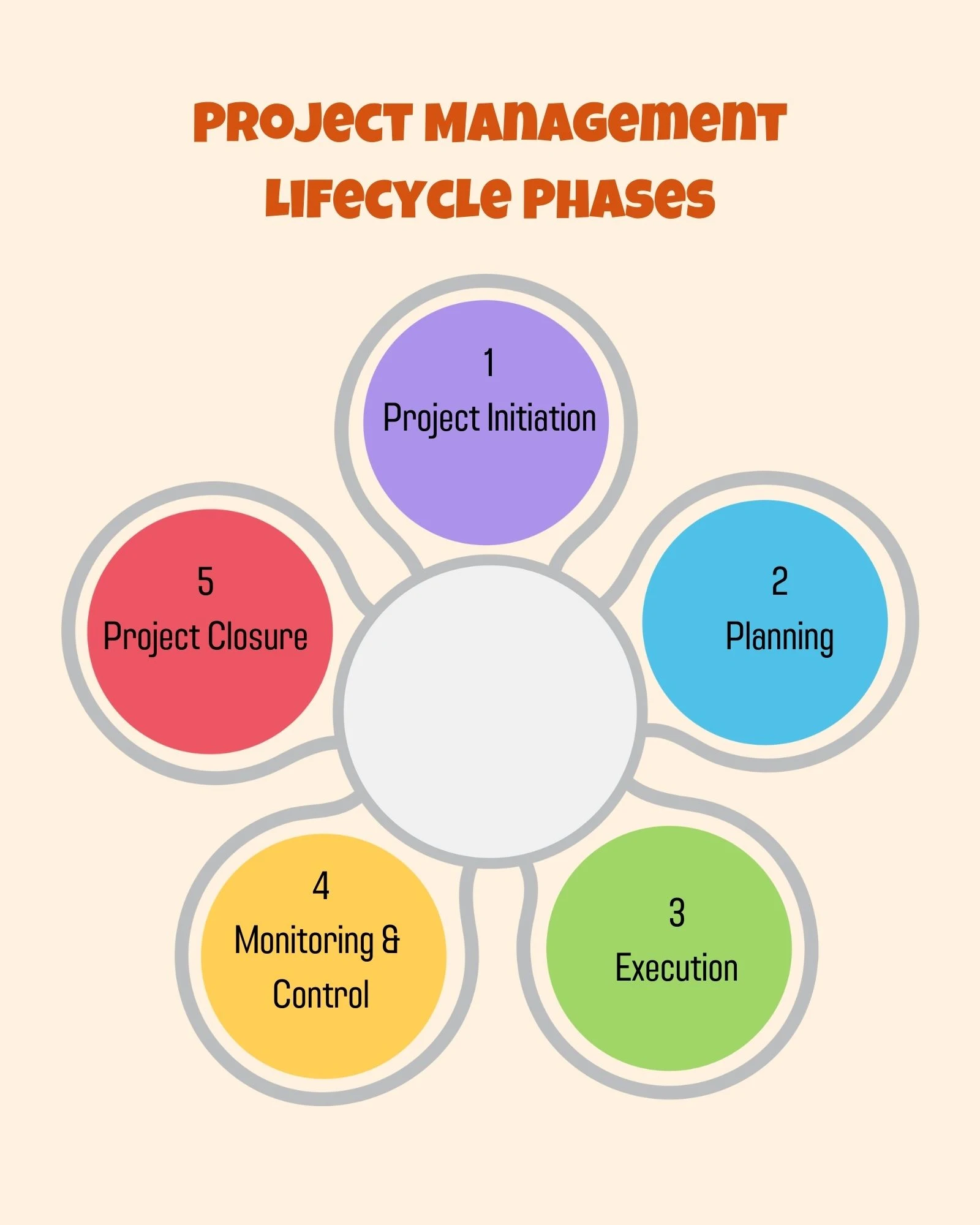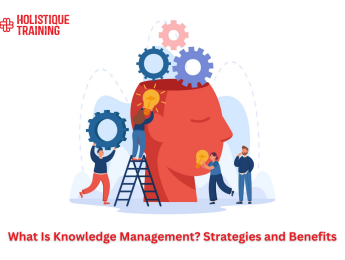- Table of Contents
- What Does Project Management Entail?
- Project Management Lifecycle Phases
- 1. Project Initiation
- 2. Planning
- 3. Execution
- 4. Monitoring and Control
- 5. Project Closure
- Benefits of Emphasising Project Lifecycle Phases:
- Essential Project Management Skills
- Leadership
- Communication
- Planning and Organisation
- Risk Management
- Problem-Solving
- Adaptability
- Negotiation
- Time Management
- Why Is Project Management Training Important?
- Enhanced Project Success
- Increased Productivity
- Improved Communication and Collaboration
- Risk Mitigation
- Scalability and Adaptability
- Strategic Decision-Making
- How to Train Your Employees
- 1. Formal Training Programmes
- 2. Certification Programmes
- 3. On-the-Job Training
- 4. Mentoring and Coaching
- 5. Continuous Learning Opportunities
- 6. Practical Simulations and Role-Playing
- 7. Collaborative Workshops and Group Projects
- Conclusion
Introduction
In today's fast-paced business environment, successful project management is crucial for organisations aiming to achieve their goals efficiently and effectively. While project management entails a complex blend of technical, interpersonal, and strategic skills, it is often overlooked or undervalued. However, organisations that recognise the significance of project management training reap substantial benefits in terms of improved productivity, streamlined processes, and enhanced project outcomes. In this blog post, we will explore project management, the essential skills required for effective project management, why it is important, and how organisations can train their employees to become proficient project managers.
What Does Project Management Entail?
At its core, project management involves the application of knowledge, skills, tools, and techniques to successfully plan, execute, monitor, control, and close projects. Project managers are critical in guiding projects from initiation to completion, ensuring that objectives are met within the defined scope, time, and budget constraints. They coordinate resources, manage risks, resolve conflicts, and communicate with stakeholders. Effective project management encompasses various key areas, including project initiation, planning, execution, monitoring and control, and project closure.
Project Management Lifecycle Phases
To truly comprehend the intricacies of project management, one must delve into the fundamental phases that define a project's life cycle. These phases serve as a roadmap, guiding project managers and their teams from conception to completion, ensuring that the project stays on course, within budget, and delivers the desired outcomes. Let’s explore each phase in the project management lifecycle in detail:

1. Project Initiation
In the initiation phase, project managers lay the cornerstone of the project. The project's purpose, goals, and objectives are defined here. Key stakeholders are identified, and their expectations are analysed and documented. Project managers must conduct a feasibility study at this stage, assessing the project’s viability, risks, and potential challenges. Budgets and timelines are established, giving the project a clear direction and purpose. Without a solid initiation phase, a project lacks a strong foundation, making it susceptible to veering off course later on.
2. Planning
The planning phase is the meticulous process of creating a roadmap that outlines every aspect of the project. Project managers break down the project into tasks, define roles and responsibilities, and allocate resources appropriately. This phase involves creating detailed schedules, setting milestones, and establishing performance indicators. Risk management strategies are also devised, foreseeing potential obstacles and outlining mitigation plans. Comprehensive planning ensures that the project stays on track and provides a structured approach for the team to follow, fostering efficiency and organisation.
3. Execution
The execution phase is where the rubber meets the road. Plans are implemented, and tasks are assigned to the team members. Project managers coordinate resources, facilitate effective communication, and oversee the day-to-day activities. This phase demands exceptional leadership and communication skills. Project managers must ensure everyone understands their roles, deadlines are met, and the project progresses as planned. It's a phase where adaptability shines; unforeseen challenges may arise, requiring quick thinking and problem-solving skills to maintain momentum.
4. Monitoring and Control
Project management is not linear; projects often encounter deviations and unexpected challenges. During the monitoring and control phase, project managers keep a watchful eye on the project's progress. Regular checkpoints are established to compare actual progress with the planned milestones. Key performance indicators are analysed, and any variances are addressed promptly. Risk management strategies developed in the planning phase are tested here. Project managers must be proactive, identifying potential issues before escalating and implementing corrective actions. This phase demands constant vigilance and adaptability, ensuring the project stays on course despite the inevitable hurdles.
5. Project Closure
The project closure phase marks the culmination of the project. It's not merely a conclusion but a structured process to ensure all project objectives are met. Project managers thoroughly review deliverables, ensuring they align with the project requirements and quality standards. Formal acceptance is obtained from stakeholders, signifying the successful completion of the project. Lessons learned during the project are documented, providing valuable insights for future endeavours. Closure also involves transitioning the project outcomes to the organisation's client or concerned department, ensuring a seamless handover. Effective closure is more than just tying loose ends; it's about ensuring that the project’s impact endures, leaving a legacy of success for the organisation.
Benefits of Emphasising Project Lifecycle Phases:
Clear Direction:
Each phase provides a clear set of objectives, ensuring the project team knows precisely what is expected at every stage.
Risk Mitigation:
By addressing risks at various stages, the project team can proactively navigate challenges and minimise their impact on the project.
Efficiency:
Following a structured life cycle ensures that resources are utilised efficiently, tasks are streamlined, and redundancies are eliminated.
Continuous Improvement:
The lessons learned in each phase contribute to continuous improvement. Organisations can refine their processes by analysing past projects and enhancing future project outcomes.
Stakeholder Confidence:
Transparent communication and a systematic approach instill confidence in stakeholders. When they witness a project progressing through well-defined phases, they trust the project management process.
Incorporating these phases into project management practices ensures a holistic approach, where projects are executed, nurtured, guided, and ultimately celebrated as successes. Understanding the lifecycle phases equips project managers with the tools they need to steer their projects through the complexities of the business landscape, ensuring that every endeavour contributes meaningfully to the organisation’s goals.
Methodology | Focus Areas | Key Benefits |
Waterfall | Sequential phases, detailed planning | Clear project milestones. |
Agile | Iterative, collaborative, flexibility | Rapid adaptability to client feedback. |
Scrum | Iterative, teamwork, continuous delivery | Transparency and improved team efficiency. |
Kanban | Visualise workflow, limit work-in-progress | Enhanced efficiency and flexibility. |
Lean Project | Eliminate waste, continuous improvement | Increased productivity and cost-effectiveness. |
Table 1: Comparative analysis of different project management methodologies
Essential Project Management Skills
Successful project management relies on a diverse set of skills that enable project managers to navigate complex challenges and drive projects toward success. Some essential project management skills include:
Leadership
Effective project managers are, above all, exceptional leaders. They inspire and motivate their teams, fostering an environment where creativity flourishes and productivity soars. Leadership in project management involves more than just issuing directives; it's about setting an example, being approachable, and offering guidance when needed. A skilled leader understands the strengths and weaknesses of team members, allocating tasks in alignment with their abilities. They instil confidence, encourage open communication, and create a sense of purpose that unites the team towards a common goal.
Communication
Clear and concise communication is the backbone of successful project management. Project managers must articulate project goals, expectations, and updates with precision. They need to convey complex ideas in a manner understandable to diverse stakeholders, team members, and clients. Moreover, active listening is equally crucial; understanding concerns, feedback, and suggestions from team members fosters a collaborative atmosphere. Effective communicators inspire trust and prevent misunderstandings, ensuring everyone is on the same page throughout the project lifecycle.
Planning and Organisation
Meticulous planning is the bedrock upon which successful projects are built. Project managers must be adept at breaking down projects into manageable tasks, setting realistic timelines, and allocating resources effectively. This skill involves forecasting potential bottlenecks, identifying dependencies, and creating contingency plans. Effective organisation extends beyond task management; it encompasses resource allocation, budget management, and risk assessment. A well-structured plan not only keeps the project on track but also enables efficient resource utilisation, maximising productivity and minimising wastage.
Risk Management
Every project has inherent risks, be they technical, financial, or operational. Skilled project managers can identify potential risks, assess their impact, and develop strategies to mitigate them. This involves scenario planning, understanding the probability of each risk, and having contingency plans in place. Proactive risk management minimises the impact of unforeseen events, ensuring that the project progresses smoothly despite challenges. Adept risk managers anticipate issues, allowing the team to address them swiftly and maintain project momentum.
Problem-Solving
Projects rarely unfold without obstacles. Whether it's a technical glitch, resource shortage, or an unexpected change in requirements, project managers must be adept problem solvers. Analytical thinking, creativity, and the ability to make informed decisions under pressure are essential. Problem-solving skills enable project managers to assess the situation objectively, identify viable solutions, and implement the most effective course of action. Timely and efficient problem resolution prevents minor hiccups from escalating into project-threatening crises.
Adaptability
In the dynamic landscape of project management, adaptability is a prized skill. Project managers must be open to change, whether it's a shift in project scope, unexpected resource constraints, or evolving client requirements. Embracing change involves staying updated with industry trends, being receptive to new technologies, and encouraging the team to explore innovative approaches. Adaptable project managers respond effectively to change and leverage it to enhance project outcomes. They view challenges as opportunities for growth, fostering a culture of innovation within the team.
Negotiation
Negotiation skills are invaluable when dealing with stakeholders, team members, and clients. Project managers often find themselves in situations where conflicting interests must be reconciled. Negotiation involves finding common ground, resolving disputes, and ensuring that all parties are satisfied with the outcome. Skilled negotiators maintain professionalism, listen actively, and focus on mutually beneficial solutions. Effective negotiation builds trust, strengthens relationships, and facilitates collaboration, essential elements for successful project delivery.
Time Management
Time is a finite resource in project management. Project managers must effectively balance multiple tasks, deadlines, and priorities. Time management skills enable them to prioritise tasks, allocate resources judiciously, and adhere to project schedules. This skill involves setting realistic timelines, avoiding procrastination, and optimising workflows. Effective time managers ensure that the project progresses steadily, meeting milestones and deadlines without compromising on quality.
Why Is Project Management Training Important?
Investing in project management training yields significant advantages for both individuals and organisations. According to a study by PMI in 2020, project management training is offered by 61% of organisations, while 47% have established a well-defined career path for project professionals. This shows that companies are starting to realise how important PM training is. Here are some key reasons why:
Enhanced Project Success
Project management training equips professionals with the knowledge and skills necessary to navigate projects successfully. In-depth training provides insights into best practices, proven methodologies, and strategies for overcoming challenges. Well-trained project managers can steer projects through complexities, ensuring they are delivered on time, within budget, and with the desired outcomes. The ability to handle various project scenarios with expertise significantly enhances the likelihood of project success.
Increased Productivity
Project management training introduces individuals to efficient techniques and tools that streamline project processes. Project managers enhance productivity by learning how to optimise workflows, eliminate redundancies, and allocate resources judiciously. Streamlined processes mean tasks are completed more efficiently, deadlines are met promptly, and projects progress smoothly. This increased productivity directly impacts the organisation's bottom line, ensuring resources are utilised effectively and results are achieved efficiently.
Improved Communication and Collaboration
Effective communication and collaboration are at the heart of successful project management. Project management training emphasises the importance of clear communication, ensuring that project goals, expectations, and updates are conveyed to team members and stakeholders effectively. Additionally, collaboration skills are honed, fostering an environment where team members work harmoniously, share ideas, and contribute collectively to project success. Improved communication and collaboration lead to reduced misunderstandings, enhanced stakeholder satisfaction, and a cohesive project team.
Risk Mitigation
Project management training equips individuals with the ability to identify, assess, and mitigate risks effectively. Project managers learn to anticipate potential challenges through specialised training, develop contingency plans, and proactively address uncertainties. By being proactive in risk management, organisations can minimise the impact of disruptions, ensuring that projects stay on course even in the face of unexpected challenges. Effective risk mitigation strategies lead to smoother project execution and reduced project-related stress.
Scalability and Adaptability
Projects come in various sizes and complexities. Project management training imparts adaptable skills and methodologies that can be customised to suit a project's specific needs. Professionals learn how to scale their project management approach, ensuring that strategies are tailored to the scope and requirements of each project. Moreover, training instills adaptability, enabling project managers to embrace new technologies, methodologies, and industry best practices. The ability to adapt ensures that projects remain relevant and effective in a rapidly changing business landscape.
Strategic Decision-Making
Project management training imparts technical skills and hones the art of strategic decision-making. Professionals learn how to analyse situations, evaluate options, and make informed decisions that align with organisational goals. Strategic decision-making ensures that projects are completed successfully and contribute meaningfully to the organisation’s overall objectives. By fostering leaders who can make sound decisions under pressure, project management training enhances an organisation’s capacity to thrive in competitive markets.
Benefits | Description |
Enhanced Project Outcomes | Improved success rates, quality results |
Increased Employee Productivity | Streamlined processes, efficient resource allocation |
Better Communication | Clearer articulation, reduced misunderstandings |
Proactive Risk Mitigation | Identification, assessment and effective management |
Scalability and Adaptability | Tailored approaches for varying project complexities |
Table 2: Benefits of project management training
How to Train Your Employees
Training employees in the art and science of project management is not just an investment; it's a strategic decision that can transform your organisation’s approach to projects. Here’s a comprehensive guide on how to train your employees effectively, nurturing project management excellence within your team:
1. Formal Training Programmes
Implement structured training programmes that cover project management principles, methodologies, and best practices. These programmes can be conducted through in-house workshops, external training providers, or online learning platforms. We provide all of the mentioned training formats!
2. Certification Programmes
Encourage employees to pursue reputable project management certifications such as courses registered and certified by the Project Management Institute (PMI)® or Certified Associate in Project Management (CAPM)®. These certifications are globally recognised and validate an individual's expertise in project management. Certification programmes provide a structured curriculum and often require practical project experience, ensuring that employees have hands-on knowledge. Certification holders deeply understand project management principles, making them invaluable assets to your organisation.
3. On-the-Job Training
There’s no substitute for hands-on experience. Assign employees to actual projects under the guidance of experienced project managers. This on-the-job training allows them to apply theoretical knowledge in real-world scenarios. Working on live projects provides invaluable insights into project dynamics, team collaboration, and stakeholder management. Encourage employees to take ownership of specific project tasks, allowing them to develop problem-solving skills and learn how to navigate challenges firsthand. On-the-job training builds competence and boosts confidence, preparing employees for more significant project responsibilities in the future.
4. Mentoring and Coaching
Pair less-experienced employees with seasoned project managers who can serve as mentors. Mentorship programmes facilitate knowledge transfer, enabling employees to learn from the experiences of their mentors. Seasoned project managers can share practical insights, offer guidance in complex situations, and provide feedback on performance. Coaching sessions can focus on specific skills development, such as effective communication, leadership, or risk management. Mentorship and coaching create a supportive learning environment, nurturing the growth of aspiring project managers.
5. Continuous Learning Opportunities
Promote a culture of continuous learning within your organisation. Provide access to project management resources, webinars, conferences, and workshops. Encourage employees to participate in relevant professional development activities, fostering a mindset of ongoing improvement. Continuous learning keeps employees updated with the latest industry trends, emerging technologies, and best practices. It encourages a proactive approach to skill enhancement, ensuring your team remains at the forefront of project management innovations.
6. Practical Simulations and Role-Playing
Engage employees in practical simulations and role-playing exercises. Simulations allow employees to experience various project scenarios in a controlled environment. Employees enhance their decision-making and problem-solving skills by making decisions, resolving conflicts, and managing resources in simulated projects. Role-playing exercises focus on interpersonal skills, such as negotiation, conflict resolution, and stakeholder management. These interactive activities provide a safe space for employees to practise and refine their skills, preparing them for real-world project challenges.
7. Collaborative Workshops and Group Projects
Organise collaborative workshops and group projects that require employees to work together as a team. Collaborative workshops encourage brainstorming, idea sharing, and collective problem-solving. Group projects allow employees to collaborate on specific tasks, fostering team dynamics and enhancing communication skills. These activities simulate real project environments, providing employees with a taste of teamwork, collaboration, and coordination. Team-based learning experiences strengthen interpersonal relationships, creating a cohesive project team.
In short, training your employees in project management is not just about acquiring skills; it’s about cultivating expertise, fostering innovation, and nurturing a culture of excellence. By investing in formal training programmes, certification courses, on-the-job training, mentorship, continuous learning opportunities, practical simulations, and collaborative workshops, you empower your employees to become proficient project managers.
Conclusion
Project management training is a crucial investment that empowers organisations and individuals to excel in today's dynamic business landscape. By equipping employees with essential project management skills, organisations can improve project success rates, enhance productivity, and foster effective communication and collaboration. Through structured training programmes, certifications, on-the-job experiences, and continuous learning opportunities, organisations can develop a pool of competent project managers who can lead projects to success.
Lucky for you, if you're now considering enrolling in project management courses or even training your employees, we can help you with just that. We offer comprehensive training programmes and courses designed for both beginner and expert project managers, ensuring that you and your team have the necessary skills to drive project success. Embrace project management training as a strategic imperative and unlock a world of opportunities for your organisation's growth and achievements by contacting us now.






















